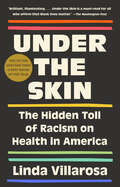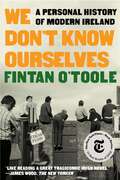Title search results
Showing 1 - 2 of 2 items

Under the Skin: The Hidden Toll of Racism on American Lives (Pulitzer Prize Finalist)
By Linda Villarosa. 2022
Braille (Contracted), Electronic braille (Contracted), DAISY Audio (CD), DAISY Audio (Direct to Player), DAISY Audio (Zip), DAISY text (Direct to player), DAISY text (Zip), Word (Zip), ePub (Zip)
Health and medicine, Medicine, General non-fiction
Synthetic audio, Automated braille
PULITZER PRIZE FINALIST • "A stunning exposé of why Black people in our society 'live sicker and die quicker'—an eye-opening game…
changer."—Oprah DailyFrom an award-winning writer at the New York Times Magazine and a contributor to the 1619 Project comes a landmark book that tells the full story of racial health disparities in America, revealing the toll racism takes on individuals and the health of our nation.In 2018, Linda Villarosa's New York Times Magazine article on maternal and infant mortality among black mothers and babies in America caused an awakening. Hundreds of studies had previously established a link between racial discrimination and the health of Black Americans, with little progress toward solutions. But Villarosa's article exposing that a Black woman with a college education is as likely to die or nearly die in childbirth as a white woman with an eighth grade education made racial disparities in health care impossible to ignore.Now, in Under the Skin, Linda Villarosa lays bare the forces in the American health-care system and in American society that cause Black people to &“live sicker and die quicker&” compared to their white counterparts. Today's medical texts and instruments still carry fallacious slavery-era assumptions that Black bodies are fundamentally different from white bodies. Study after study of medical settings show worse treatment and outcomes for Black patients. Black people live in dirtier, more polluted communities due to environmental racism and neglect from all levels of government. And, most powerfully, Villarosa describes the new understanding that coping with the daily scourge of racism ages Black people prematurely. Anchored by unforgettable human stories and offering incontrovertible proof, Under the Skin is dramatic, tragic, and necessary reading.
We Don't Know Ourselves: A Personal History of Modern Ireland
By Fintan O'Toole. 2021
Braille (Contracted), Electronic braille (Contracted), DAISY Audio (CD), DAISY Audio (Direct to Player), DAISY Audio (Zip), DAISY text (Direct to player), DAISY text (Zip), Word (Zip), ePub (Zip)
Literature biography, Politics and government biography, European history, Politics and government
Synthetic audio, Automated braille
NEW YORK TIMES BESTSELLER NEW YORK TIMES • 10 BEST BOOKS OF THE YEAR NATIONAL BESTSELLER The Atlantic: 10 Best…
Books of 2022 Best Books of the Year: Washington Post, New Yorker, Salon, Foreign Affairs, New Statesman, Chicago Public Library, Vroman's “[L]ike reading a great tragicomic Irish novel.” —James Wood, The New Yorker “Masterful . . . astonishing.” —Cullen Murphy, The Atlantic "A landmark history . . . Leavened by the brilliance of O'Toole's insights and wit.” —Claire Messud, Harper’s Winner • 2021 An Post Irish Book Award — Nonfiction Book of the Year • from the judges: “The most remarkable Irish nonfiction book I’ve read in the last 10 years”; “[A] book for the ages.” A celebrated Irish writer’s magisterial, brilliantly insightful chronicle of the wrenching transformations that dragged his homeland into the modern world. Fintan O’Toole was born in the year the revolution began. It was 1958, and the Irish government—in despair, because all the young people were leaving—opened the country to foreign investment and popular culture. So began a decades-long, ongoing experiment with Irish national identity. In We Don’t Know Ourselves, O’Toole, one of the Anglophone world’s most consummate stylists, weaves his own experiences into Irish social, cultural, and economic change, showing how Ireland, in just one lifetime, has gone from a reactionary “backwater” to an almost totally open society—perhaps the most astonishing national transformation in modern history. Born to a working-class family in the Dublin suburbs, O’Toole served as an altar boy and attended a Christian Brothers school, much as his forebears did. He was enthralled by American Westerns suddenly appearing on Irish television, which were not that far from his own experience, given that Ireland’s main export was beef and it was still not unknown for herds of cattle to clatter down Dublin’s streets. Yet the Westerns were a sign of what was to come. O’Toole narrates the once unthinkable collapse of the all-powerful Catholic Church, brought down by scandal and by the activism of ordinary Irish, women in particular. He relates the horrific violence of the Troubles in Northern Ireland, which led most Irish to reject violent nationalism. In O’Toole’s telling, America became a lodestar, from John F. Kennedy’s 1963 visit, when the soon-to-be martyred American president was welcomed as a native son, to the emergence of the Irish technology sector in the late 1990s, driven by American corporations, which set Ireland on the path toward particular disaster during the 2008 financial crisis. A remarkably compassionate yet exacting observer, O’Toole in coruscating prose captures the peculiar Irish habit of “deliberate unknowing,” which allowed myths of national greatness to persist even as the foundations were crumbling. Forty years in the making, We Don’t Know Ourselves is a landmark work, a memoir and a national history that ultimately reveals how the two modes are entwined for all of us.